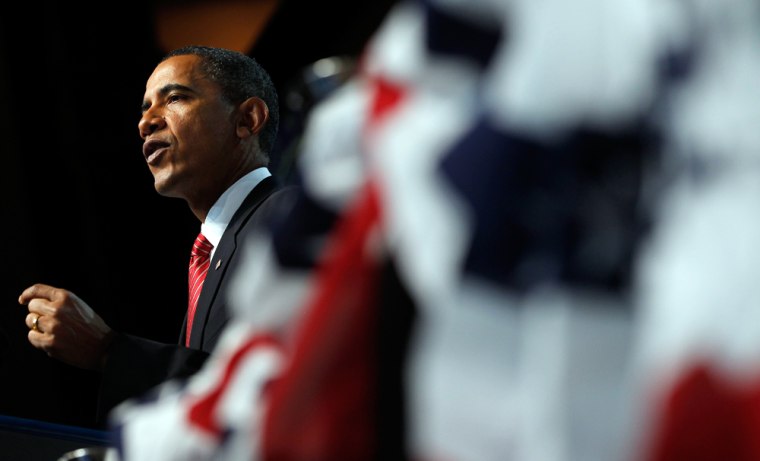President Barack Obama said Monday that he is on track to fulfill his campaign promise of ending the war in Iraq as he marked a milestone in winding down major combat operations there this month.
Despite a deadlock in Baghdad on efforts to form a new government, Obama highlighted achievements in Iraq and discussed the formal shift taking place in the disposition of U.S. troops as they transition to a more advisory role.
"As a candidate for president, I pledged to bring the war in Iraq to a responsible end," Obama said in his speech to the Disabled American Veterans convention in Atlanta.
"Shortly after taking office, I announced our new strategy for Iraq and for a transition to full Iraqi responsibility. And I made it clear that by August 31, 2010 America's combat mission in Iraq would end. And that is exactly what we are doing — as promised, on schedule."
The president also said, "the hard truth is we have not seen the end of American sacrifice in Iraq. But make no mistake, our commitment in Iraq is changing — from a military effort led by our troops to a civilian effort led by our diplomats."
A transitional force of 50,000 troops will remain to train Iraqi security forces, conduct counterterrorism operations and provide security for ongoing U.S. civilian efforts. Under an agreement negotiated in 2008 with the Iraqis, all American troops are to be gone from Iraq by the end of next year.
Ongoing instability
Still, on the day Obama cited progress, two bombings and a drive-by shooting killed 11 people, a reminder of Iraq's ongoing instability.
In the worst incident Monday, suspected al-Qaida militants blew up the house of a policeman west of Baghdad and killed him, his wife and 4-year-old daughter while the family was sleeping.
Seven other family members, including four of the policeman's sons, were wounded in the blast, officials said, speaking on condition of anonymity because they were not authorized to talk to the media.
Separate attacks in Baghdad, including one targeting police, killed five more and wounded 15. And around the northern city of Mosul, a series of bombings killed three people.
The latest violence and government figures showing that July was the deadliest month for Iraqis in more than two years revived persistent questions about the readiness by Iraqi security forces to take over from the Americans as the U.S. military draws down its forces.
Just as Obama has drawn down forces in Iraq, he has increased the U.S. commitment in Afghanistan, ordering a surge of 30,000 additional troops.
But with casualties on the rise in Afghanistan, there are fresh concerns about the 9-year mission in the country, as well as Obama's plan to begin withdrawing troops in July 2011, a timetable that critics say will embolden the Taliban and other extremist groups in the region.
In his speech on Monday, the president reminded Americans that al-Qaida was responsible for the terror attacks on September 11, 2001, and that the war in Afghanistan is not over.
"We will tolerate no safe haven for al-Qaida and its extremist allies," Obama said. "We will disrupt, we will dismantle, and we will ultimately defeat al-Qaida."
He also made clear that he would "give our troops the resources and the equipment to get the job done and keep our country safe."
'Fairly modest goal'
Facing a potential loss of public and congressional support for the Afghanistan war, the White House is painting the U.S. mission there as humble and achievable: keeping the region from being a haven for terrorists.
"What we're looking to do is difficult, very difficult, but it's a fairly modest goal," Obama told the CBS "Sunday Morning" show.
Despite the surge in Afghanistan, there are fewer U.S. troops serving in Iraq and Afghanistan now than there were when Obama took office last year. Come September, when the Iraq drawdown is complete, the White House says there will 146,000 troops on the ground in the two countries, down from 177,000 in January 2009.
Speaking before a mostly friendly crowd of more than 2,500 disabled veterans, some in wheelchairs, others with lost limbs, Obama promised an all-out effort to support troops. "Your government is going to take care of you when you come home," he said.
"While our country has sometimes been divided, they have fought together as one," Obama said. "While other individuals and institutions have shirked responsibility, they have welcomed it."
After the speech, Obama was scheduled to attend a fundraising lunch for the Democratic National Committee, his latest stop in a summer fundraising sprint that also includes events in Chicago later this week.
But Georgia's most prominent Democrat, former Gov. Roy Barnes, won't be joining Obama at either of his stops Monday. Barnes, who is running to get his old job back, had previously scheduled events in southern Georgia, his campaign said.
Distancing himself from the president could be politically smart for Barnes. Georgia is a Republican stronghold that John McCain carried in 2008. A poll conducted by Mason-Dixon Polling & Research Inc. in July had Obama with a 37 percent approval rating in the state. Fifty percent of those surveyed disapproved of Obama's performance.
